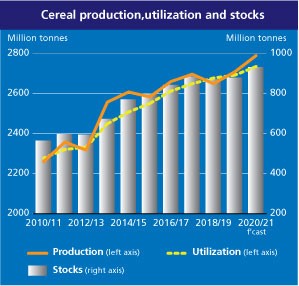At the top of Google News search results today for “climate change” is an article claiming global warming is punishing global crop production, and is especially punishing sub-Saharan African, South American, and South Asian crops. However, objective crop data reported by the United Nations Food and Agriculture Organization (FAO) tells an entirely different story. Not only is global food production setting new records virtually every year, but the regions and nations that are claimed to be suffering the most are almost all enjoying record crop production.
The Google-promoted article is published by GreenBiz and titled “Climate change will continue to widen gaps in food security, new study finds.” The GreenBiz article references a study published in Nature Food claiming climate change will “hamper farmers’ abilities to maintain current harvests.” Also, the study claims, “countries already facing food insecurity will be disproportionately affected.”
Predictions and claims of global warming causing crop failure and global hunger are nothing new. Thirty years ago, the United Nations Intergovernmental Panel on Climate Change’s (IPCC) 1990 First Assessment Report predicted, “Patterns of agricultural trade could be altered by decreased cereal production in some of the currently high-production areas.” Also, five years ago, the IPCC Fifth Assessment Report claimed, “Climate related impacts are already reducing crop yields in some parts of the world.”
However, hard data from the FAO show the opposite is true. Yields of the most important cereal crops have increased dramatically over the past few decades, repeatedly setting new records. As shown in the chart below, the FAO’s recent “Cereal Supply and Demand Brief” reports new global records are being set nearly every year for production of the cereal crops (corn, wheat, rice, and similar crop staples) that comprise most of global food consumption.

FAO Cereal Supply and Demand Brief, August 10, 2020.
Cereal grains include the Big Three food staples of corn, rice, wheat and similar crops. Corn, rice, and wheat by themselves comprise 66 percent of global human food consumption. Cereal crops alone make up nine of the 15 crops that provide 90 percent of the humanity’s food energy intake. As shown above, the FAO reports cereal grain production set new records seven of the past 10 years.
Looking ahead, the online agriculture news service World-Grain.com recently published a story, “IGC projects record output for corn, wheat and soybeans,” highlighting the International Grains Council’s findings that it expects global yields of corn, rice, soybeans, and wheat to set new records again in 2020, despite the pandemic.
Global warming lengthens growing seasons, reduces frost events, and makes more land suitable for crop production. Also, carbon dioxide is an aerial fertilizer for plant life. These factors have resulted in the largest decline in hunger, malnutrition, and starvation in human history.
Although 700 million people worldwide still suffer from persistent hunger, the United Nations reports the number of hungry people has declined by two billion people during the past 30 years of global warming – since 1990.
Regarding the specific nations and regions cited by GreenBiz, let’s start with South America. The FAO documents that Argentina, Brazil, Chile, Ecuador, Paraguay, Peru, Uruguay, and Venezuela are all setting new records virtually every year for yields per acre.
Regarding sub-Saharan Africa, the FAO documents that Burkina-Faso, Madagascar, South Africa, Uganda, and Zambia are all setting new records virtually every year for yields per acre. The nations not setting records nearly every year are nevertheless, at worst, averaging as much crop production as was the case in previous decades.
Regarding South Asia, the FAO documents that Bangladesh, Cambodia, China, India, Indonesia, Laos, Malaysia, Nepal, the Philippines, Thailand, and Vietnam are all setting new records virtually every year for yields per acre.
In short, farmers around the world are producing more crops every year as the Earth modestly warms, debunking longstanding predictions and claims that global warming decimates crop production. Objective data from the U.N. Food and Agriculture Organization (FAO) clearly show global crop production and food stocks have increased significantly during recent years and decades as the Earth has modestly warmed.
Climate change is helping reduce world hunger, not increasing food insecurity.
























[…] pointed out in Climate Realism articles (see, for example, here, here, here, here, here, here, here, here, here, and here) crop yields per acre are increasing all […]